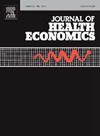劳动所得税抵免对美国代际健康流动性的影响。
IF 3.6
2区 经济学
Q1 ECONOMICS
Journal of Health Economics
Pub Date : 2025-09-01
Epub Date: 2025-08-07
DOI:10.1016/j.jhealeco.2025.103048
引用次数: 0
摘要
代际卫生流动是卫生机会和平等的重要标志,但这一领域的实证研究仍然很少,特别是关于公共政策影响的实证研究。作为美国规模最大、最有效的反贫困项目之一,我们首次提出了劳动所得税抵免(EITC)对代际健康流动性影响的实证证据。我们使用收入动态小组研究中自我报告的健康状况,并探索儿童暴露于最大EITC收益的时间、地理和家庭结构差异。我们发现EITC总体上改善了代际健康流动性,尤其是向上的健康流动性。本文章由计算机程序翻译,如有差异,请以英文原文为准。
The effects of earned income tax credits on intergenerational health mobility in the United States.
Intergenerational health mobility is an important marker of health opportunity and equity, yet empirical research in this field remains sparse, particularly concerning the effects of public policies. We present the first empirical evidence of the effects of the Earned Income Tax Credits (EITC), one of the largest and most effective anti-poverty programs in the US, on intergenerational health mobility. We use self-reported health status from the Panel Study of Income Dynamics and explore temporal, geographic, and family structure variations in childhood exposure to maximum EITC benefits. We find that the EITC generally improved intergenerational health mobility, especially upward health mobility.
求助全文
通过发布文献求助,成功后即可免费获取论文全文。
去求助
来源期刊

Journal of Health Economics
医学-卫生保健
CiteScore
6.10
自引率
2.90%
发文量
96
审稿时长
49 days
期刊介绍:
This journal seeks articles related to the economics of health and medical care. Its scope will include the following topics:
Production and supply of health services;
Demand and utilization of health services;
Financing of health services;
Determinants of health, including investments in health and risky health behaviors;
Economic consequences of ill-health;
Behavioral models of demanders, suppliers and other health care agencies;
Evaluation of policy interventions that yield economic insights;
Efficiency and distributional aspects of health policy;
and such other topics as the Editors may deem appropriate.
 求助内容:
求助内容: 应助结果提醒方式:
应助结果提醒方式:


